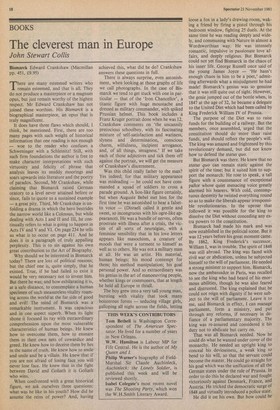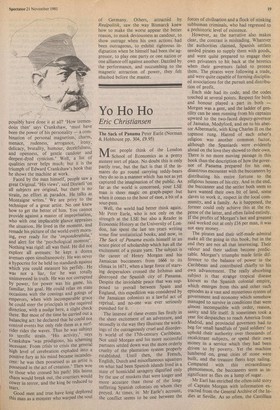BOOKS
The cleverest man in Europe
John Stewart Collis
Bismarck Edward Crankshaw (Macmillan pp. 451, £9.95) There are many esteemed writers who I remain esteemed, and that is all. They do not produce a masterpiece or a magnum opus, but just remain worthy of the highest respect. Mr Edward Crankshaw has not joined these worthies. His Bismarck is a biographical masterpiece, an opus that is truly magnificent.
It does have three flaws which should, I think, be mentioned. First, there are too many pages with such weight of historical information that one reading is not enough — woe to the reader who confuses a Schweninger with a Schleinitz! Still, with such firm foundations the author is free to make character interpretations with such virtuosity and felicity of phrase that analysis leaves its muddy moorings and soars upwards into literature and the poetry of paradox. Second, Mr Crankshaw, while claiming that Bismarck raised German oratory to a level never attained before or since, fails to quote us a sustained example — a great pity. Third, Mr Crankshaw is unfolding a drama in which the hero bestrides the narrow world like a Colossus, but while dealing with Acts I and II and III, he continually refers to what is going to happen in Acts IV and V and VI. On page 234 he tells us what is to occur on page 411. And he does it in a paragraph of truly appalling perplexity. This is to sin against his own great contribution to the Art of Biography.
Why should we be interested in Bismarck today? There are lots of political reasons; but the chief one is, quite simply, that he existed. True, if he had failed to exist it would be very necessary not to invent him. But there he was; and how exhilarating it is, at a safe distance, to contemplate a human specimen of such measureless vitality roaming across the world at the far side of good and evil! The mind of Bismarck was a remarkable instrument. It was capacious and in one aspect superb. When its light shone it focused its ray with extraordinary comprehension upon the most vulnerable characteristics of human beings. He knew how to overcome them, how to ensnare them in their own nets of cowardice and greed. He knew how to deceive them by lies in the name of truth. He knew how to smile and smile and be a villain. He knew that if you are not afraid of losing face you will never lose face. He knew that in the fight between David and Goliath it is Goliath who wins.
When confronted with a great historical figure, we ask ourselves three questions: what was he like in his youth? How did he assume the reins of power? And, having achieved this, what did he do? Crankshaw answers these questions in full.
There is always surprise, even astonishment, when looking at those graphs of life we call photographs. In the case of Bismarck we tend to get stuck with one in particular — that of the 'Iron Chancellor', a titanic figure with huge moustache and dressed as military commander, with spiked Prussian helmet. This book includes a Franz Kruger portrait done when he was 12. Crankshaw comments on 'the uncannily precocious schoolboy, with its fascinating mixture of self-satisfaction and wariness, slyness and determination, conscious charm, wilfulness, incipient arrogance, and, of all things, smugness.' If we take each of those adjectives and tick them off against the portrait, we will get the measure of Crankshaw's discernment.
Was this child really father to the man? Yes indeed; for that military appearance was misleading — he could not have commanded a squad of soldiers to cross a parade ground. A lion-like figure certainly, but when Auguste Bebel met him for the first time he was astonished to hear a falsetto voice — (Disraeli called it gentle and sweet, so incongruous with his ogre-like appearance). He was a bundle of nerves, often prostrate with illness after a crisis, the victim of all sorts of neuralgias, with a feminine sensibility that in his love letters appears like masochism, a creature of moods that were a torment to himself as well as to others. He was not a military man at all. He was an artist. His material, human beings; his mood contempt for them; his method manipulation; his goal personal power. And so extraordinary was his genius in the art of manoeuvring people, whether kings or commoners, that at length he held all Europe in thrall.
The boy grew into a very tall young man, bursting with vitality that took many boisterous forms — seducing village girls, galloping all night across the fields, letting loose a fox in a lady's drawing-room, waking a friend by firing a pistol through his bedroom window, fighting 25 duels. At the same time he was reading deeply and widely, and communing with Nature in almost a Wordsworthian way. He was intensely romantic, impulsive in passionate love affairs, and deeply religious. But Bismarck could not yet find Bismarck in the chaos of his inner life. George Russell once said of the young James Joyce — 'He hasn't enough chaos in him to be a poet,' admit ting afterwards what a misjudgment he had made! Bismarck's genius was so genuine that it was still quite out of sight. However, the genie jumped out of the bottle when, in 1847 at the age of 32, he became a delegate to the United Diet which had been called by King Frederick William IV of Prussia.
The purpose of the Diet was to raise funds for the building of a railway. But the members, once assembled, urged that the constitution should do more than raise funds, and should reflect the people's will.
The king was amazed and frightened by this revolutionary demand, but did not know how to defend the status quo.
But Bismarck was there. He knew that no status quo can remain static against the spirit of the time; but it suited him to sup port the monarch. He rose to speak, a tall figure with a countenance of exceptional pallor whose quiet menacing voice greatly alarmed his hearers. With cold, contemptuous dexterity he twisted everything round so as to make the liberals appear irresponsible revolutionaries. In the uproar that followed it was possible for the king to dissolve the Diet without conceding any extra powers to the constitution.
Bismarck had made his mark and was now established in the political scene. But it was 12 years before his great moment came.
By 1862, King Frederick's successor, William I, was in trouble. The spirit of 1848 was still abroad. The king was faced with civil war or abdication, unless he subjected himself to the will of parliament. He needed a strong minister to support him. Bismarck, now the ambassador in Paris, was recalled to see the king who had heard of his enor mous abilities, though he was also feared and distrusted. The king explained that he could not reign with dignity if he were sub ject to the will of parliament. Leave it to me, said Bismarck in effect, I can manage parliament, form a ministry, and put through any reforms, if necessary in defiance of a parliamentary majority. The king was re-assured and considered it his duty not to abdicate but carry on.
That was all Bismarck needed. Now he could do what he wanted under cover of the monarchy. He needed an upright king to conceal his deviousness, a weak king to bend to his will, so that the servant could become the master. He could go straight for his goal which was the unification of all the German states under the rule of Prussia. In order to do this he declared war and fought victoriously against Denmark, France, and Austria. He tricked the democratic surge of 1848 and virtually introduced a police state.
He did it on his own. But how could he possibly have done it at all? 'How tremendous then' says Crankshaw, 'must have been the power of his personality — a combination of personal magnetism, charm, menace, rudeness, arrogance, irony, delicacy, brutality, humour, deceitfulness, and openness, of gentle candour and deepest-dyed cynicism.' Well, a list of qualities never helps much; but it is the triumph of Edward Crankshaw's book that he shows the machine at work.
Faced by the man himself, people saw a great Original. 'His views', said Disraeli 'on all subjects are Original, but there is no strain, no effort at paradox. He talks as Montaigne writes.' We are privy to the technique of a great artist. No one knew how to get the better of him. You cannot provide against a master of improvisation, who with one implacable glance appraises the situation. He lived in the moment, and remade his picture of the world every morning, ever ready for the 'imponderabilia,' and alert for the 'psychological moment'. Nothing was rigid: all was fluid. He did not explore all avenues: he kept a dozen avenues open simultaneously. He was never a hypocrite for he held no standards against Which you could measure his perfidy. He was not a liar, for he was totally uninterested in truth. He was not corrupted by power, for power was his game, his familiar, his goal. He could relax on state occasions with the comings and goings of emperors, when with incomparable grace he could steer the principals in the required direction, with a nudge here, a slight check there. But most of the time he carried out a balancing act: he declared that he could not control events but only ride them as a surfrider rides the waves. Thus he was subject to terrific strain. 'His activity,' says Crankshaw 'was prodigious, his scheming Incessant. From crisis to crisis the general high level of cerebration exploded into a Positive fury as his mind became incandescent: he was then possessed as an artist is Possessed in the act of creation.' Then woe to those who crossed his path! His latent Chaos would break out, the courtiers would cower in terror, and the king be reduced to tears.
Good men and true have long deplored this man as a monster who warped the soul of Germany. Others, attracted by Realpolitik, saw the way Bismarck knew how to make the worse appear the better reason, to mask deviousness as candour, to show outrage when his own actions had been outrageous, to exhibit righteous indignation when he himself had been the aggressor, to play one party or one nation or one alliance off against another. Dazzled by the performance, and succumbing to the magnetic attraction of power, they felt abashed before the master.











































 Previous page
Previous page